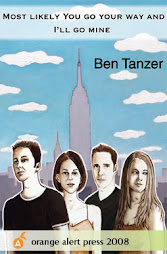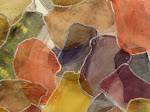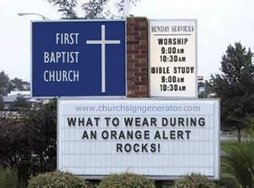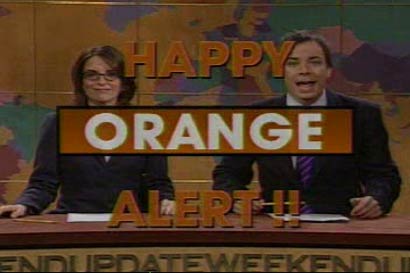Thursday, November 01, 2007
Writer's Corner
Charles Blackstone
Lately I have been fascinated by the connection between the reader and the novel, and in relation, the novel and the author. Even though they write fiction, every writer puts a piece of themselves into every page of every novel. The novel is a product of the writer's passion and thoughts, dreams and realities, it is bound a presented to the reader without any notion or direction on how it should be received. The reader choose the time, the place, and the mindset in which the author's novel will be read. The reader may set out with a variety of intentions, but their truest goal, more times then not, is to escape. The reader wants to get away from their lives and wander through the life and thoughts of the characters the writer has created.
One Chicago writer who has demonstrate a true ability to convey the thoughts of his characters is Charles Blackstone. In addition to appearing in numerous literary journals, Charles is also the author of the 2004 novel The Week You Weren't Here. He is also the co-editor of a forthcoming literary anthology, The Art of Friction: Where (Non) Fictions Come Together (University of Texas Press, 2008).
Recently, Charles took some time to answer a few of my questions on his writing style and the connection between the reader and the novel.
Orange Alert (OA): There are several aspects of your short fiction and your novel that make them appear to be autobiographical (location, profession, perspective, reoccurring characters, and so on). The general theme of your work seems focus on the dysfunctional nature of the male/female relationship. Are there parts or sections of your life in your work? How do you keep the two separate when you are writing so close to home?
Charles Blackstone (CB): Yeah, definitely. I’ve never really consciously endeavored to keep myself out of the picture, or maintain separate existences, as it were. I’ve always figured, if there’s something I’ve done, seen, heard about, thought about, then it has the potential to get assigned to a character. And I feel like I’m still a part of things even when I’m writing scenes for which I have no firsthand experience, because I’m trying to see the world through the character’s eyes, feeling, thinking, improvising as the character would.
OA: There has been much written about the use of punctuation in your debut novel, The Week You Weren't Here . My thoughts are that you were trying to replicate the thought pattern of the main character, Hunter. What was purpose behind your use of punctuation?
CB: That was precisely my thinking, that if there were a brain-transcribing device, and you attached it to Hunter’s head, this is a version of what you’d see reeling out. I think all the punctuation is in there, though. Pauses, asides, moments where the pace speeds or slows. When I’ve read from the book out loud, audiences are often surprised that I read at a normal—perhaps even slower than normal—pace. They expected me to read as they imagined the voice, very fast, not pausing. There’s no one way to interpret the voice. Another thing I started to discover writing with limited punctuation (the finished book actually is a lot more punctuated and paragraphed than the original manuscript) was that sentences were up for multiple interpretations, that the elision between unstopped sentences created newer and more exciting multiple meanings within themselves, and of course this seemed completely appropriate for trying to capture an uncertain, questioning, self-reflexive voice like Hunter’s.
OA: In an interview a few years back, you had this to say about the relationship between the reader and the book, "they take residence within your consciousness and, whether you know it or not, reside permanently". It seems as though the reader wants to "get away from it all", but as find themselves at the same time. What are your thoughts these days on the connection between the reader and novel?
CB: This morning my wife was talking about how much she liked Indiana Jones and the Temple of Doom as a kid, a movie I recall wanting to watch, but finding myself unable to follow. The same was true with Star Wars. When the band teacher played the trilogy at the end of the school year—he knew better than to try to get us to take out our instruments and sit up straight with mere hours of chromatic scale bleating time standing in the way of our summer vacations—I just zoned out. I remember struggling to get past the first sentence of a C.S. Lewis book when I was nine. What I might have once attributed to ADD, I now see as an inability to “escape.” I write realism, and read realistic fiction, and watch films with realistic stories, problems I may have experienced, or could imagine myself experiencing, because I want more life in my life, not less. I like to be able to see myself in characters I read. When a novel really has me, I feel like I start thinking like the protagonist, maybe speaking like him or her. That is very cool to me. That’s the kind of experience I want to create for my readers. If they’re willing to have it. There really is no point to novels without readers to engage. The stories only come alive when people are able to experience them.
OA: While reading a book I like to insert items (newspaper clippings, dry leaves, empty sugar packets, concert flyer's, words...) inside the covers. These are small memories of the days or weeks I spent reading this work. They may or may not relate to the story, but definitely relate to the time in my life. What are some habits or rituals you go through while reading a book? What items might someone place inside the cover of The Week You Weren't Here?
CB: That’s so funny. I do the same thing. If you come over and pick up most of the books on my shelves, you’ll find random grocery receipts from supermarkets in Paris, things I’ve scribbled, flyers from college, and everything else. Right now, I’m reading the new DeLillo book, and my bookmarks are a couple of these download-a-free-song-from-iTunes that Starbucks has been giving out, and a few Americano receipts. When reading, I like to mark passages, look up words in the dictionary, write their definitions in the book or on receipts, and sometimes even sketch something for a future story I might write, if something I read inspires me. In a random copy of TWYWH, I wouldn’t be surprised to find a CTA card, numerous restaurant receipts, maybe a ballpoint pen? Probably an unpaid parking ticket or two. In the copy I took on my book tour, there are numerous post-it notes and a couple of bookmarks from stores along the route.
OA: What is your opinion of the current literary scene in Chicago?
CB: I think things are getting very exciting in the city. New reading series, literary journals, events, writers appearing everywhere, and not always in the typical bookstore and bar venues. There’s a lot happening, but not so much going on that the choices are paralyzing. In New York, there’s such a profusion of everything literary, readings, book signings, series, that I think people don’t know what to do and just say fuck it and go drinking. The writers in New York are also under a lot of pressure, because it’s hard to get into certain series if you don’t have a book out, and it’s hard to draw a crowd to your book signing when you’re competing with Don DeLillo and Ian McEwan for audience. I feel like there’s more of a community among the writers here than elsewhere in the country.
OA: What's next for Charles Blackstone?
CB: I’ve co-edited an anthology of short fiction and creative non-fiction, The Art of Friction, which is coming out fall 2008. I’ve also recently finished a new novel, which my agent is indefatigably shopping around as we speak. I hope to return to teaching fiction in the spring—I’ve been working with writers on an individual basis, which has been great, but I miss the energy of a workshop, so, MFA students, keep your fingers crossed.
Bonus Questions:
OA: Coffee? If yes what is your favorite type of coffee and where is your favorite coffee spot?
CB: Absolutely. My favorite kind is strong, drip, bottomless. When I lived in the Ukrainian Village, I liked to go to Filter, but I guess that’s closed now? Over the summer, my wife and I would hang out in the little park on State, at Rush, in the area affectionately known as the Viagra Triangle, and make fun of all the Bentley and Hummer drivers going into Tavern on Rush while we sipped. We also got a coffee grinder, so I’ve appointed myself house barista. Trader Joe’s house blend is pretty good, but, regrettably, not as brain-tasering as some commercial grade varieties. I grew up drinking coffee at the Medici on 57th in Hyde Park, and whenever I’m in the neighborhood, I always try to stop by for a mug or four.
OA: What type of music do you listen to, and does this music ever make its way into your work? CB: The new novel is set in the 90s, so there’s a lot of music in there from that time, music that meant a lot to me back then and still does. The characters are also younger, college students, so I think they’re more attuned to songs in the air than the rest of us. Big Head Todd, The Breeders, XTC (the title of the novel, The Difference Between a Lemon and a Lime, comes from the XTC song “Senses Working Overtime”), Material Issue, Liz Phair, Inspiral Carpets, stuff from the 80s that was still kicking around then, Howard Jones, Billy Idol. These days, I try to keep an ear on pop music, as a means of deluding myself into thinking I’m not getting older and losing touch, but a lot of it is just so uninspired and unappealing. I listen to music mostly when I’m running on a treadmill, so I shamefully have embraced some cheesy pop songs with fast beats to keep me from getting bored. Don’t ask me to show you my iPod. It’s kind of embarrassing. Okay, if you must look, just skip ahead to the Death Cab and Interpol tracks. My dignity is at stake.
OA: What is it like to be married to the most famous sommelier in Chicagoland?
CB: We have a lot of fun together, and there’s always something good in my wine glass. There are a lot of surprising similarities in our professional lives. People tend to respond to wine like they do to literature. The majority of people out there are only familiar with what’s popular, and what’s popular isn’t always an indication of quality, and so it’s up to us (she wine, me words) to get people to see that there’s a lot more out there, and the more obscure a wine, or novel, the more enjoyable it often is. When we met, I liked to drink wine, but I couldn’t have told you the difference between pinot grigio and pinot noir, and now I can say I prefer Argentine Malbec, because it has the structure of a cabernet, but is juicy and spicy like shiraz. The wine knowledge has started to affect my characters, who used to drink way too much chardonnay, but now have expanded their palates a little.
For more information on Charles Blackstone please visit his website.
Subscribe to:
Post Comments (Atom)
+by+Nick+Volkert).jpg)






















1 comment:
An Orange raincoat is the obvious answer!
Post a Comment